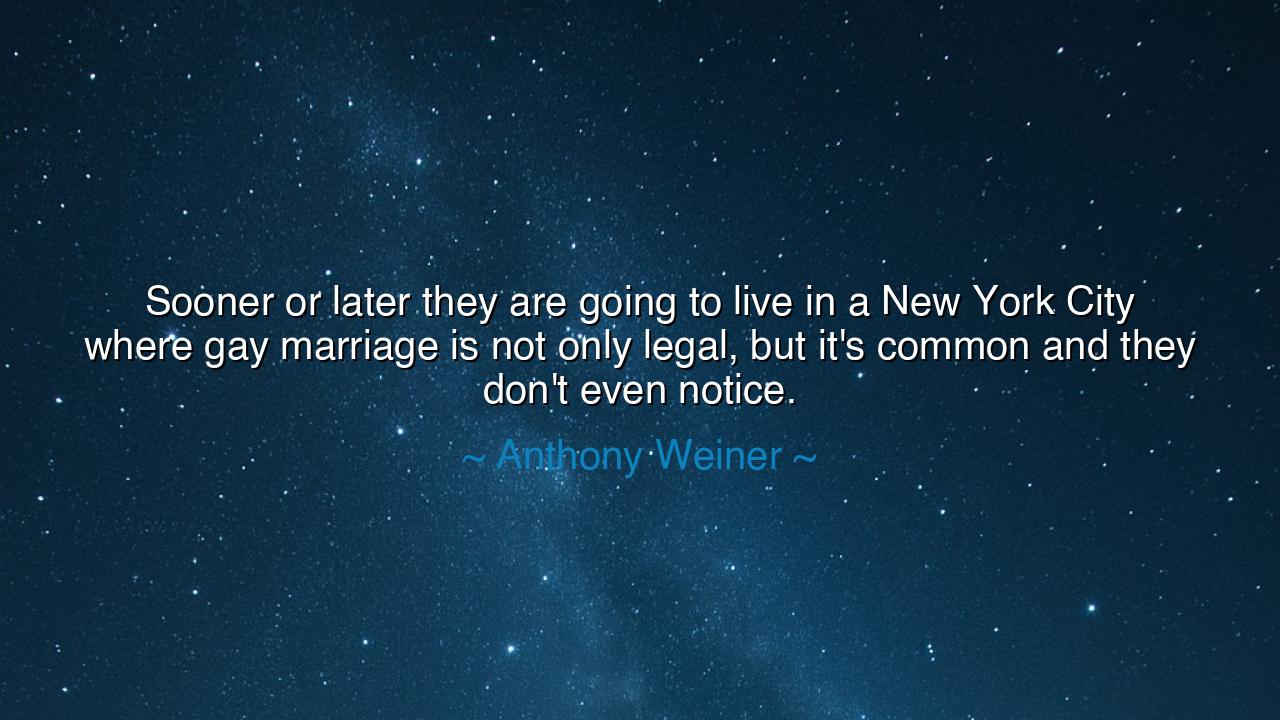
Sooner or later they are going to live in a New York City where
Sooner or later they are going to live in a New York City where gay marriage is not only legal, but it's common and they don't even notice.






Hear me, O children of the future, for I speak of a world that is in flux—a world where change is the constant, and progress unfolds in the most unexpected ways. The words of Anthony Weiner ring with a prophetic clarity: "Sooner or later, they are going to live in a New York City where gay marriage is not only legal, but it's common and they don't even notice." These words carry the power of foresight, for they tell of a time when love—in all its forms—will be recognized not as something exceptional or rare, but as a natural part of the human experience. In this future, people will no longer see the love between two people of the same sex as strange, but as ordinary, as commonplace as any other union. It will be, in the words of Weiner, something that they will not even notice—because it will simply be part of the fabric of life.
In ancient times, children, there were many practices that we now view with horror—practices that, in their day, were seen as normal, unquestioned by the masses. One need look no further than the practice of slavery, which existed in many of the great civilizations—Greece, Rome, and Egypt—and was accepted as the natural order of things. Yet, through the efforts of those who dared to challenge the status quo, the concept of human dignity and the equality of all people began to take root, and slavery, once common, became a relic of a less enlightened time. Just as slavery was once seen as the norm and is now rejected by the conscience of the world, so too will gay marriage—once contentious and controversial—become a matter of course in the future.
Consider the ancient Greeks, who celebrated many forms of love and union, though often in ways that modern society would find complex or even troubling. Socrates, the great philosopher, had relationships that went beyond the traditional marriages we now recognize. Yet, in his time, these relationships were not seen as inherently wrong—they were simply part of the fabric of Greek society. Over time, however, the concept of love has expanded, deepened, and become more inclusive. In the same way, what was once considered unconventional—gay marriage—will, in the future, be viewed with the same indifference as we now view the once-taboo practice of interfaith or interracial marriages. Change, though slow, is a force that cannot be stopped.
The wisdom of Anthony Weiner lies in his recognition that society evolves. What was once controversial and divisive becomes, in time, commonplace. The fight for equality is not a battle for the few, but a battle for the many. It is not only about securing rights, but about reshaping perceptions—transforming what was once seen as unnatural into something as ordinary and accepted as any other union. Just as interracial marriage once faced resistance, and now is a part of the cultural norm, so too will gay marriage be viewed as a natural expression of love, one that is free from the shackles of fear and prejudice.
History, children, is full of such revolutions of thought. The civil rights movement, led by figures such as Martin Luther King Jr., fought not only for the legal rights of Black Americans, but for the recognition of their humanity. The battle was not just against laws, but against the very prejudices that had been ingrained in society for centuries. It was a battle of ideas, a battle that, in time, shifted the consciousness of an entire nation. The fight for gay rights—and particularly the right to marry—shares a similar trajectory. It is not merely a struggle for legal recognition, but for the cultural shift that will allow future generations to see same-sex love as just as worthy and just as natural as any other.
The lesson to be learned, children, is that change is inevitable, though it may come slowly. The struggles of the past—the fight for the rights of women, for the equality of the races, for the recognition of the LGBTQ community—are all part of the same great wave of human progress. What is unthinkable today may become the norm tomorrow. The path toward equality is not easy, and it often requires courage to stand up against the forces of tradition and prejudice. But with every step taken toward justice, the world becomes a little more whole, a little more unified, a little more human.
So, children, take Anthony Weiner’s vision to heart. Understand that the future is not shaped by the obstacles of today, but by the dreams of those who dare to imagine a world that is more just, more inclusive, and more loving. Let us, too, be part of this movement—let us speak out for justice, for equality, and for the freedom of all to love without fear or shame. The day will come when the world will look upon the marriage of gay couples as just another expression of the universal truth that love, in all its forms, should be celebrated. May we live in such a world and work to make that world a reality for the generations to come.






AAdministratorAdministrator
Welcome, honored guests. Please leave a comment, we will respond soon